连续冷却速率对直拉单晶硅电学性能的影响
来源:wenku7.com 资料编号:WK76506 资料等级:★★★★★ %E8%B5%84%E6%96%99%E7%BC%96%E5%8F%B7%EF%BC%9AWK76506
以下是资料介绍,如需要完整的请充值下载。
1.无需注册登录,支付后按照提示操作即可获取该资料.
2.资料以网页介绍的为准,下载后不会有水印.资料仅供学习参考之用. 密 保 惠 帮助
资料介绍
连续冷却速率对直拉单晶硅电学性能的影响(含任务书,开题报告,外文翻译,毕业论文14800字,答辩PPT)
摘 要
在单晶硅太阳能电池的池制作过程中,单晶硅片要经过磷扩散、铝背电极制作等几步热过程,这些热过程对单晶硅片的电学性能会产生怎样的影响,对能否制备高效硅晶太阳电池非常重要。本文就热过程不同的连续冷却速率对单晶硅少数载流子寿命和电阻率的影响进行了研究。实验结果表明,单晶硅块经高温加热分别以不同冷却速率冷却后,其少子寿命随冷却速率的增加而降低,与此同时,其电阻率也随冷却速率的增加而降低。本文还对实验的结果进行了理论分析。
关键词: 单晶硅;少子寿命;电阻率;连续冷却。
Effect of continuous cooling rate on the electrical properties of Czochralski silicon
Abstract
Czochralski (CZ) silicon is about to participate into several thermal process during the production process of CZ silicon solar battery, the cooling rate in the cool down process, however, has a considerable influence upon the electrical properties of CZ silicon. In our experiment, several cooling rates are taken into consideration to research the minority-carrier lifetime and resistivity of CZ silicon buck after cooling down. And the result of experiment shows that, after cooling down within different rates, respectively, after thermal insulation, through analyzing the minority-carrier lifetime and resistivity after the continuous cooling, minority-carrier lifetime in CZ silicon buck decreases with the increase of cool rate, and the resistivity appears in the same way.
Key words: Czochralski silicon; minority-carrier lifetime; resistivity; continuous cooling.
实验内容
主要的实验内容分以下几点。.
(1) 把单晶硅试样于高温加热,然后淬冷,使氧、碳分别以间隙和替位形式存在于单晶硅中。用四探针电阻率测试仪和少子寿命测试仪测定预处理后的硅片电阻率、间隙氧含量和替位碳含量以及少子寿命,以作为样品无复合体、氧沉淀或碳沉淀状态时原始样品数据。
(2) 把试样加热后以不同的冷却速率冷却,用四探针电阻率测试仪和少子寿命测试仪对试样分别进行电阻率和少子寿命进行检测,以研究冷却速率对单晶硅少子寿命和电阻率的影响。
(3) 分析热处理冷却速率和方式对单晶硅片少子寿命和电阻率的影响规律,并对其机理进行探讨。

目 录
摘要 ……………………………………………………………………………….I
Abstract …………………………………………………………………………...II
1 引言……………………………………………………………………………...1
1.1太阳能电池发展背景………………………………………………………..1
1.2研究少子寿命的意义………………………………………………………..3
1.3晶体硅的热处理……………………………………………………………..5
1.4晶体硅热过程研究的国内外现状及发展趋势……………………………..6
1.5本课题研究意义及内容……………………………………………………..7
2 实验内容………………………………………………………………………...9
2.1实验样品与试剂……………………………………………………………..9
2.2实验仪器……………………………………………………………………10
2.3实验方案……………………………………………………………………14
2.4实验流程图…………………………………………………………………15
2.5实验过程……………………………………………………………………16
3 结果与讨论……………………………………………………………………..21
3.1冷却速率对少子寿命的影响………………………………………………21
3.2冷却速率对电阻率的影响…………………………………………………27
4 结论…………………………………………………………………………….30
参考文献………………………………………………………………………….31
致谢 ……………………………………………………………………………...32
|



